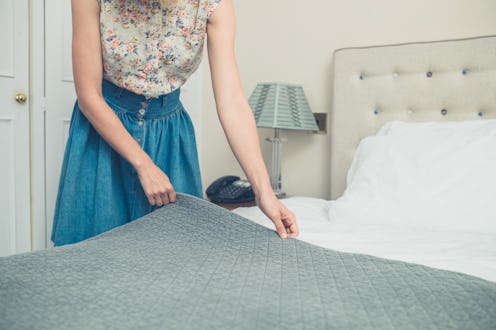Life
If You Have These 7 Habits Around The House, You May Have High-Functioning Anxiety

We all have quirks and idiosyncrasies when it comes to how we take care of our living spaces. Maybe your roommate likes to keep the windows open at all hours of the day or night, and you would prefer to keep your apartment, like, not drafty and full of bugs. But some housekeeping habits may lie on the far end of the quirky spectrum; things like keeping endless lists, or never throwing out mail, or only cleaning with a particular brand of non-toxic cleaners. And these habits may be a sign of high functioning anxiety — a term used to describe the behavior of people who experience anxiety while maintaining their lives at a high level.
If you hold down a competitive job, a happy relationship, and a flourishing social life, you can still experience behaviors or thought patterns that stem from anxiety. One of the biggest places this can show up is at places you spend lots of time, like home or work. Anxiety in high-functioning people may not be visible to others, but the patterns of behavior that anxiety causes can impact your mental wellness in subtle ways. If any of the issues on this list strike you as radically familiar, it might be helpful to examine how you manage your anxiety.
1You Keep Lists For Everything
Many of us have lists to deal with household chores and tasks, but people with high-functioning anxiety take it to another level; their list-making manifests a need for control, and what may look charmingly 'neurotic' is actually an anxious attempt to ward off disaster. Listing everything in order to feel calm, refusing to let anybody else in the household take control of task-making or organization, and experiencing symptoms of anxiety if things on the list or schedule don't go to plan, are all signals that you may have high-functioning anxiety.
2You Don't Get Rid Of Anything
It's always worth having candles if you're in an area that has blackouts, and blankets to prepare for cold nights. But people who have high-functioning anxiety take it to another level. Anxiety disorders often create behavior that's designed to mitigate felt (but not real) threats, and that can show up in household care too. Hoarding is a signal of anxious behavior, whether it's refusing to throw out mail because you might need it in the future, or because future emergencies definitely warrant fifty tins of canned corn. If you hoard when you experience stress or worry, it's not preparedness; it's anxiety.
3You Blow Household Issues Out Of Proportion
There's value in liking things just so, especially when it comes to where you live. But if having one little thing out of place — a stove burner that won't turn on, or window blinds that don't close all the way — causes you undue discomfort, it could be a sign of high-functioning anxiety. People with high-functioning anxiety disorders will take simple cues that may induce mild concern (or nothing) in other people and spin them into catastrophic scenarios that demand care immediately.
4You Have Rigid Routines
If you keep a set of morning or evening routines that are impossible to break — such as needing to run the dishwasher every night, even if it's not full, or vacuuming a room at the same time every day — it could be a sign of high-functioning anxiety. This can even stem to behaviors that are traditionally thought of as being on the obsessive-compulsive disorder spectrum, such as locking and unlocking doors a certain amount of time. A person with high-functioning anxiety may have a collection of non-essential household routines that must be completed or they'll feel extremely uncomfortable and panicky.
5You Need Isolation
"At times," the mental health organization Bridges To Recovery notes, people with anxiety "need to get away, to find the time and the privacy to relax and decompress. Loved ones may misinterpret their absences as a sign that they’ve done something wrong, but anxiety can be difficult to bear and people with high-functioning anxiety sometimes need space." And that means your own home may feel like a haven and a source of stress all at once. If you find yourself isolating from roommates or family members, it could be a sign of high-functioning anxiety.
6You're Constantly Cleaning Something
Elaborate busy-ness is a key characteristic of high-functioning anxiety, and is part of the reason it appears so functional: being busy is valued by our culture, and getting a lot done can indeed be a bonus in busy lives. But people with high-functioning anxiety find it impossible to relax or lose "control" of their environment, so must continually keep inventing tasks and chores to assuage their panic. This may mean actual self-care, like fueling yourself or sleeping enough, gets put to one side to make sure that the house is sparkling.
7Breaking Something Starts A Worry Spiral
Things break. It's just something that happens. But for people with high-functioning anxiety, that normal household accident can set off a rumination "spiral" of worry that makes it very difficult to let go of the incident and move on. Disaster-oriented thinking will take a small accident and amplify it to huge proportions (splinters, infection, the person who gave you the cup hating you) that continue to expand.
High-functioning anxiety, like all anxiety, can be helped by therapy and some cases benefit from medication — so don't view it as a side effect of an "otherwise fine" life. If you find yourself uncomfortable as a result of these behaviors, you can seek help to feel better.